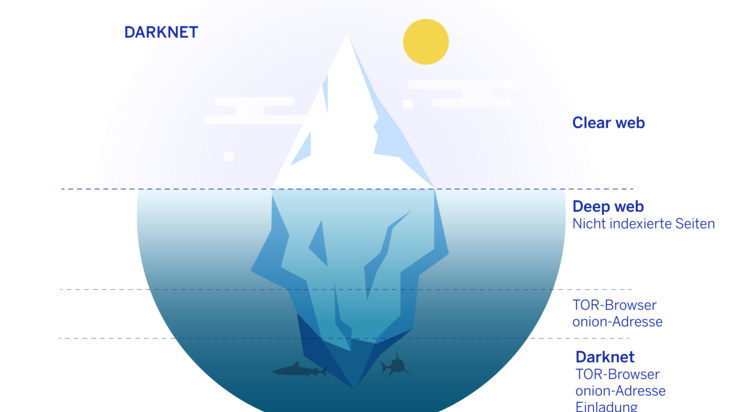In which place do criminals sell drugs while politically persecuted people stand up for their rights? The darknet is an anonymous area of the Internet, not openly visible and accessible only through a special network. It has a bad reputation, but it holds hope for all those who long for privacy or are not allowed to express their opinions freely.
Myths and legends: What is the darknet and what makes it so special?
The myths
Hidden from the eyes of the ordinary Internet community, the Darknet is a place surrounded by myths and legends. Secret societies are said to decide on access to certain areas. Celebrities who maintain their networks in secret. Freedom fighters who organize themselves there. Even traditional Mafia clans are said to conduct a large part of their business on the Darknet. But in order to understand what makes the Darknet so special, you first have to get to grips with how it works.
The three levels of the Internet
There are three levels on the Internet: The Clear Web, the Deep Web and the Darknet. The visible part of the Internet is called the Clear Web. It can be found with the help of search engines and is openly accessible, such as this page. One level behind it is the Deep Web (translated: deep net). This part is access-restricted, partly encrypted and/or for the most part not found via search engines. Closed member areas or digital bank accounts are just a few examples of the Deep Web. On the last level is the Darknet (translated: dark web). This area can only be accessed with the so-called Tor network. With the appropriate extension for the Internet browser, anyone can use the network. Connection data is encrypted several times and anonymized. The necessary software can be freely downloaded from the Internet. Certain areas can only be accessed by invitation and with a password.
What does the Darknet look like?
On the surface, the darknet looks very similar to the openly accessible parts of the Internet (see screenshot). There are various sites, forums, online marketplaces, communication services and even search engines. Even Facebook has offered a version on the TOR network (https://facebookcorewwwi.onion/) since 2014. In the early 2000s, work on the Tor network as we know it started in the US. It developed in parallel with the Clear Web and has increasingly adapted to the habits of “normal” Internet users. In the process, its size has grown enormously. However, many parts are accessible only by invitation and with the right credentials. For this, the user must have the right contacts, which he has either made in the real world or whose trust he has earned on the Internet. People who move around on the darknet could not be more different.
Crime and the fight for freedom: Who uses the darknet?
The darknet has an average of around 250,000 users in Germany. However, estimates of the number of users of the Tor network vary widely. At the beginning of this year, there was brief talk of as many as 1.5 million users in Germany. According to Tor statistics, the network currently has around 2.5 million users worldwide.
Criminal
Around 57% of all Tor websites offer illegal content, according to a 2016 study by Daniel Moore and Thomas Rid. Drug dealers, arms dealers, contract killers, human traffickers, pedophiles, hackers and other criminals use the network to offer their goods or services. On the darknet, you can buy anything the illegal market has to offer: Rare wildlife, account information, cyberattacks or records of strangers. In anonymity, they can communicate with their customers undetected and evade law enforcement.
Seeking protection
But the darknet also provides a safe haven for those who fear persecution. Dissidents, whistleblowers, homosexuals… Those who are persecuted in their country because of their political, religious or sexual beliefs can openly express their opinions here, exchange ideas with like-minded people and organize. During the Arab Spring, for example, opposition activists in countries like Tunisia, Egypt or Morocco organized their demonstrations on the Darknet.
Cautious
In times when companies like Google and Facebook are collecting a lot of our data, more and more people are also drawn to the darknet, for whom the protection of their privacy is important. The data is analyzed in order to offer individualized advertising and to better understand user behavior. Some people are reluctant to have their data collected per se, while others are particularly reluctant to have their data used commercially. Some use the darknet primarily because of the encrypted data transmission.
Curious
Of course, there are also many curious onlookers on the Darknet. They want to try out whether they will succeed in entering the darknet. Others want to find out what goods and services are offered there and what their prices are. But even those who just want to look around on the Darknet can be liable to prosecution. Anyone who unintentionally comes across child pornography is already liable to prosecution. After all, all information ends up in the cache of the devices used, and possession of child pornography is punishable by law.
What are the dangers of using the Tor network?
Using the Tor network is not without its dangers. In addition to the risk of unintentionally accessing sites that offer illegal content and thus making yourself liable to prosecution, you can also be attacked by cybercriminals here. The network does not offer any special protection against cyber attacks, as is so often assumed. There are also rumors that many of the network’s servers are in the hands of secret services. According to the German Federal Agency for Civic Education (Bundeszentrale für politische Bildung), a large part of the funding for the TOR project still comes from the “research pots of the US government”.
